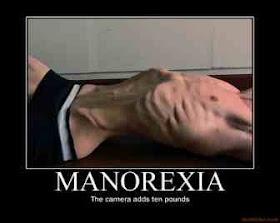Sunday, 21 November 2010
'Manorexia'
If you were to walk down the street and randomly pick people and ask them what kind of people they believe suffer from eating disorders, the majority would tell you that they believe it is an illness that only afflicts teenage girls. They might be surprised to find out that older woman and even children suffer, but they would probably be shocked to find out that men also can fall victim to this terrible disorder. Why is that? It is because society is still very much in the dark about what eating disorders really are and why someone may develop one.
Eating disorders are not a vanity issue and people do not do this so that they can fit into a smaller dress size. Many people also find this hard to believe, but eating disorders really have nothing at all to do with food. Whether you are anorexic, bulimic, or a compulsive eater, those are just the symptoms of deeper, emotional issues. Just like some people turn to alcohol as a way to cope, numb themselves, and block out painful feelings and emotions, food is also used in the same way. Anorexics can become so obsessed with counting calories and wanting to be thin, that they spend their whole day thinking about it, which leaves them no time to think about the real problems in their lives. For them, it is easier to think about calories, then it is to face the issues that they may not know how to handle. Many bulimics and compulsive eaters will tell you that when they binge, all the negative feelings, whether they are anger, sadness, stress, loneliness, inner pain, etc., will disappear. When bulimics purge, they usually feel relieved. They say it is almost like they are releasing all the negative feelings they have kept inside.
As you can see, they do not binge because they are hungry or have no willpower. They do it because it is the only way they know how to find some relief from the pain that they feel inside. There are many reasons why a person can develop an eating disorder. They may have been a victim of emotional, physical, or sexual abuse. They may have been raised in a dysfunctional family where alcohol and drugs were abused or in a family that did not allow emotions to be expressed. Some may have been overweight as a child and were subjected to constant harassing from their peers which could cause them to continue to turn to food for comfort or cause them to start to restrict their food intake.
Whatever the reason may be, it is important for people to know that eating disorders are not a vanity issue and people usually develop them as a way to cope with very intense negative feelings and emotions. Having said this, it should not surprise anyone that men too can develop eating disorders.
It is estimated that approximately 10% of eating disorder sufferers are men, but I personally feel that figure would be higher if more men came forward with their problem and if compulsive eaters were included in that figure. It is very difficult for men to reach out and ask for help because eating disorders are still very much considered a "women's disease". They may also not want to come forward for fear that people will think they are gay. Many people automatically assume if a man has an eating disorder, then he must be gay. That is not true at all. Someone's sexual preference has nothing to do with them developing an eating disorder.
The reasons men develop eating disorders are really no different then why a woman, child, or anyone else would. They may have been victims of abuse, come from dysfunctional families, were subjected to teasing from their peers, etc. They also experience the same feelings as anyone else. They have low self-esteem, are perfectionists, over achievers, do not know how to express emotions, avoid conflict, put others needs ahead of their own, feel unworthy and hate most everything about themselves. Many hate themselves so much, they feel they deserve to die. When someone feels that way, they usually start to avoid the very thing that keeps them alive, which is food.
The number of woman that suffer from eating disorders is much higher than men because men are not under the same pressure to be thin. It is more common for men to try and cope with their problems by becoming workaholics or turning to alcohol and drugs, but the number of men developing eating disorders is increasing. It can also be difficult to know if some men do in fact have an eating disorder. Bulimic men are more likely to try and purge their bodies of unwanted calories by exercising compulsively, rather than by vomiting or laxative abuse. Some people may feel the person is just staying in shape, even though the man may be exercising compulsively because he feels he has to rid himself of the calories he consumed. Many men, like a lot of women, that have been overweight and started losing weight, were praised for the weight loss. They enjoyed the attention they received from losing weight and they may decide that they need to keep losing. They believe that losing weight will help them to be accepted and it will make them happy.

No comments:
Post a Comment